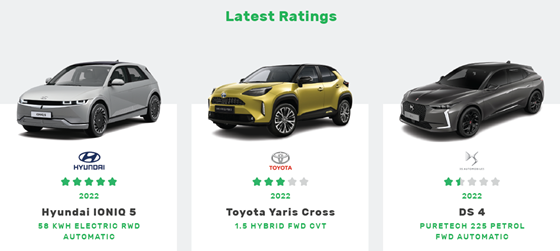
 On 24 November, Green NCAP released their latest ratings for the Hyundai IONIQ 5, Toyota Yaris Cross and DS 4.
On 24 November, Green NCAP released their latest ratings for the Hyundai IONIQ 5, Toyota Yaris Cross and DS 4.
The Hyundai IONIQ 5 is a battery electric crossover utility vehicle (CUV) with generous space and high comfort. Tested here is the model with 58 kWh battery capacity. Despite its high mass, typical for electric cars, the vehicle has low consumption values in the standard WLTC+ tests (Cold and Warm). In the dynamic Highway test, however, the IONIQ 5 consumes significantly more, and under cold winter conditions (WLTC+ test at -7°C), the figure even increases by 85% compared to the standard test. As a result, the driving range under such conditions is reduced, due to the need for cabin heating and battery management strategies. The measured battery capacity of 58.8 kWh corresponds to the declared value (58 kWh) and allows a range of about 380 km in standard real-world trips and moderate air conditioning requirements. The IONIQ 5 offers a unique design, but it comes at the cost of increased aerodynamic drag, compared to other electric vehicles. Higher energy efficiency in cold weather conditions would also help to further improve the vehicle’s sustainability score.
The lack of polluting exhaust emissions, high energy efficiency and relatively low greenhouse gas emissions from average European power generation give the Hyundai IONIQ 5 a high Weighted Overall Index of 9.4 out of 10 and a solid 5 Green stars rating.
Green NCAP tested the 2022 model of the Toyota Yaris Cross Hybrid with a 1.5 liter naturally aspirated gasoline engine, electric traction motor and a continuously variable transmission. This is a compact SUV targeting the buyers who look for high everyday comfort and functionality. The powertrain represents a good choice and demonstrating reasonable fuel consumption values together with effective minimisation of pollutants. The performance of the state-of-the-art exhaust aftertreatment system remained robust and effective under all test conditions but additional improvements are possible, especially with focus on trips with cold engine starts and dynamic conditions, where the Yaris would benefit from enhanced particle reduction measures. The quantities of emitted greenhouse gases are not unusual for a vehicle of such configuration and cap the overall result, positioning the Toyota Yaris Cross Hybrid in the fair range of 3 Green stars with a weighted Overall Index of 5.2.
The DS 4 enters the test with a powerful 165 kW petrol engine. The car respects the Euro 6 exhaust norm and performs as type approved, with CO2 emissions of about 150 g/km in the laboratory WLTC+ tests, but it doesn’t qualify for the additional robustness testing. The Highway Test imposes a challenge for the environmental performance of the DS 4 in all three categories. Here, the vehicle is not able to score any points for Clean Air or Greenhouse Gases and only 1.5 points for Energy Efficiency. The exhaust aftertreatment lacks robustness and fuel consumption is relatively high. This brings the overall rating down significantly to just 1½ Green stars out of 5 with a Weighted Overall Index of 2.9 out of 10.
Read all the details in the datasheets at https://www.greenncap.com/